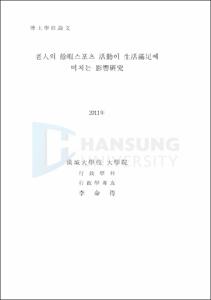老人의 餘暇스포츠 活動이 生活滿足에 미치는 影響硏究
= A Study on the Effect of Leisure Sports on Life Satisfaction for the Aged
- Files in This Item:
-
-
Download
 000000900336.pdf
기타 데이터 / 751.47 kB / Adobe PDF
000000900336.pdf
기타 데이터 / 751.47 kB / Adobe PDF
-
Items in Repository are protected by copyright, with all rights reserved, unless otherwise indicated.